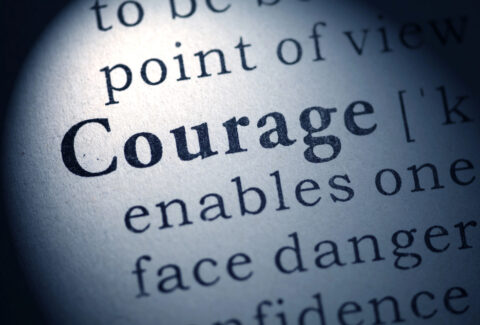The Courage to Love: Embracing Vulnerability and Authenticity
Love, in its purest form, is one of the most powerful forces in the human experience.[1] It transcends boundaries, heals wounds, and brings unparalleled joy. Yet, love also requires immense courage. To truly love means to open oneself up to vulnerability, to risk pain and disappointment, and to embrace another person with authenticity and compassion.[2] The courage to love is a journey of strength, resilience, and profound personal growth.
Understanding the Courage to Love
Loving someone deeply necessitates facing our fears and insecurities. It involves trusting another person with our hearts, knowing full well that they have the power to hurt us. This vulnerability is both daunting and beautiful, as it is through opening up that we experience the deepest connections and the most meaningful relationships.[3]
The Fear of Love
Fear often stands in the way of love. Fear of rejection, fear of betrayal, fear of loss, and even fear of inadequacy can make us hesitant to fully invest in relationships. We may build walls around our hearts, believing that self-protection will keep us safe from pain. However, these walls also prevent us from experiencing the full depth and richness of love.
Embracing Vulnerability
Vulnerability is the cornerstone of love. It means showing up as our true selves, with all our imperfections and flaws, and allowing someone to see us fully. This openness can be terrifying, but it is also incredibly liberating. When we embrace vulnerability[4], we give and receive love authentically, fostering genuine connections that are based on trust and mutual respect.
The Process of Loving Courageously
- Self-Acceptance: To love others courageously, we must first love ourselves. This involves accepting our strengths and weaknesses, our successes and failures.[5] Self-love is the foundation upon which healthy and fulfilling relationships are built. When we value ourselves, we set the standard for how we expect to be treated by others.
- Trust and Openness: Trust is essential in any loving relationship.[6] It requires us to believe in the goodness of others and to open our hearts despite past hurts. Building trust takes time and effort, but it is crucial for deep and meaningful connections.
- Communication: Honest and open communication is vital for loving courageously.[7] Expressing our feelings, needs, and boundaries helps to create a safe space where love can flourish. Effective communication involves listening as much as speaking, ensuring that both parties feel heard and understood.
- Forgiveness: Love is not perfect, and mistakes will happen. The courage to love includes the ability to forgive and move past grievances.[8] Holding onto grudges only fosters resentment and hinders the growth of the relationship. Forgiveness is a gift we give to ourselves and our loved ones, allowing us to heal and move forward.
- Commitment: True love requires commitment. It means choosing to stand by someone through the ups and downs, the joys and challenges. Commitment is an act of courage because it involves a willingness to invest in the relationship and to work through difficulties together.[9]
The Benefits of Loving Courageously
Loving courageously brings immense rewards. It enriches our lives with deep connections, joy, and a sense of belonging. It fosters emotional and mental well-being, reducing stress and increasing happiness. When we love courageously, we create a ripple effect, spreading kindness, compassion, and positivity to those around us.
Real-Life Examples of Courageous Love
Consider the story of Maya Angelou, the renowned poet and civil rights activist. Despite facing immense personal and societal challenges, Angelou consistently chose to love fiercely and fearlessly. Her relationships and writings were marked by a profound sense of empathy, compassion, and understanding. Angelou’s courage to love not only enriched her own life but also inspired millions around the world to embrace love and compassion.
Conclusion
The courage to love is a powerful and transformative journey. It involves embracing vulnerability, trusting others, communicating openly, forgiving mistakes, and committing wholeheartedly. By loving courageously, we open ourselves up to the deepest and most meaningful connections, fostering emotional and mental well-being and creating a ripple effect of kindness and compassion.
Let us choose to love courageously, knowing that in doing so, we enrich our lives and the lives of those around us. The courage to love is not just about forming relationships; it is about living authentically, embracing vulnerability, and opening our hearts to the boundless possibilities of human connection.
[1] Jenkins, Carrie. What love is: And what it could be. Basic Books, 2017.
[2] Allen, Emma, and Madisen Bird. “The value of vulnerability in relationships.” Family Perspectives 1.1 (2020): 7.
[3] Brown, Brené. Daring greatly: How the courage to be vulnerable transforms the way we live, love, parent, and lead. Penguin, 2015.
[4] Butler, Judith. “Rethinking vulnerability and resistance.” Vulnerability in resistance (2016): 12-27.
[5] Bernard, Michael E. “The strength of self-acceptance.” The Strength of Self-Acceptance: Theory, Practice and Research. https://doi. org/10.1007/978-1-4614-6806-6_13 (2013).
[6] Gottman, John, Julie Gottman, and Michael A. McNulty. “The role of trust and commitment in love relationships.” Foundations for couples’ therapy. Routledge, 2017. 438-452.
[7] Jubran, Madeline, et al. “Our love language: A systematic review of the association between observed couple communication and relationship satisfaction.” Couple and Family Psychology: Research and Practice (2025).
[8] Pettigrove, Glen. Forgiveness and love. Oxford University Press, 2012.
[9] Delaney, Neil. “Romantic love and loving commitment: Articulating a modern ideal.” American Philosophical Quarterly 33.4 (1996): 339-356.







